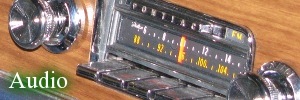















US New Vehicle Sales Up for 2002 |
|---|
 Topics: National Transportation Safety Board
Topics: National Transportation Safety Board
|
John Birchard
Washington, D.C.
August 12, 2002
 Listen to US New Vehicle Sales Up for 2002 - RealPlayer - 369KB - 2:59
Listen to US New Vehicle Sales Up for 2002 - RealPlayer - 369KB - 2:59
Despite turmoil in the stock market and shaky consumer confidence, sales of new cars and trucks in the United States continue quite strong.
After near-record sales in 2001, some industry observers believed auto sales would drop off sharply this year, because prospective customers already would have made their deals last year. Not true.
As the industry closed out a particularly strong July, George Pipas, Sales Analysis Manager at Ford Motor Company, made predictions for 2002 sales. "New car and truck sales will range between 16.5 and 17 million units. That contrasts with three straight record sales years," he said.
Mr. Pipas says the recent "roller coaster ride" with the stock market is not having any current effect on vehicle sales.
"Stock market volatility or changes in interest rates have much more to do with what sales will be six to nine months from now than what we are currently seeing today," he said.
July sales, if they were annualized, would produce a year of 18 million units sold. George Pipas says customer incentives, cash rebates and low- or no-interest rate loans brought in the buyers.
"On July 2, zero percent [financing] made its re-appearance in the U.S. auto market and sales climbed to about 18 million," he said. "So, I think there's no question that change, that sequential change from what we had seen in May and June to what we saw in July, it was definitely due to the availability of those attractive financing and cash incentive offers."
The chief economist at J.D. Power and Associates, an international marketing research firm, Bob Schnorbuss says those incentives are putting a serious dent in automakers' profits. Can they sustain the incentives?
"In the case of companies, particularly GM [General Motors], they've been very aggressive on the cost side to try to get costs down to the point where they can offer these incentives and still do better than break even," he said.
Mr. Schnorbuss says it's a rare manufacturer that can sell cars and trucks in America without customer incentives. "A few, but only a few. Honda is notorious for not offering incentives, unless it's kind of a year-end clearance," he said.
Ford's George Pipas claims his company, whose financial setbacks are well-known, can stay "in the game" with profit-squeezing incentives. "For however long this situation exists, we have no problem at all trying to keep up," he said.
For the rest of the year, J.D. Power's Bob Schnorbuss says, new vehicle sales will depend on three factors: continuing customer incentives, a relatively stable economy and a decline in the value of the U.S. dollar. "A weakening dollar makes it much easier for the Big Three [GM, Ford, Chrysler] to compete against the imports," he said.
2002 may not be a record year for automakers selling in the United States. But it still looks pretty strong.
